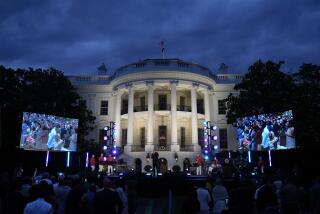The Nation Mourns, and We Rediscover Our Unity
- Share via
“Nation Mourns,” the headlines reported. “We mourn seven heroes,” said the President, declaring a week of “national mourning.” The word mourn comes up faster and more frequently than any other, after the word shock, in response to the televised explosion of the space shuttle Challenger with seven Americans on board.
Mourning is natural after shock. What distinguished the response to these deaths and this event from so many others is that other word: The nation mourns.
Grief and the routines of mourning serve many purposes. The body must make some response to shock and loss, and will find a way. That, however, moves nothing beyond the self. Generous grief reaches out and thinks first of others. Families mourn, and the community draws round them, with thoughts of the life too soon ended, of days and promises unfulfilled, of future happy occasions that will always be incomplete. This time, seven families mourn, and in the circle of those who support them stands a whole nation. The nation mourns. . . .
Mourning that combines the personal with the social has further functions. Americans are grieving for their nation, its components themselves. Poet Gerard Manley Hopkins was psychologically astute when he observed young “Margaret” grieving in autumn “over Goldengrove unleaving”--the death of foliage. It was, he told her, “Margaret you mourn for.” The nation mourns the fallen, those literally fallen out of the sky in full television view. The poet would tell that nation and all its people: “It is America you mourn for.”
Not jingoistically. Every death diminishes us, yet very few deaths diminish us all. Very few people in peacetime die representing all of us. It is hard to forget that adjective, national. Had the shuttle been launched by the Soviet Union, we might have heard of its failure and casualties. A formal diplomatic note would have gone forth expressing profound regret over the Soviets’ loss, and we would have picked up where we were Monday last, only a bit more wary about our future launchings. If the shuttle had been launched by our Western European allies, the loss would have come closer to home, and the downing of Canadians would have been regarded, as the Canadians now regard us, as even closer, downright neighborly. Yet not ours.
Ours. The shuttled Challenger embodied, as few capsules could, the pluralism that so many fear. The images are vivid: “We” are black and Asian, Jewish and Catholic and Protestant and maybe uncertain, female and male, from here and everywhere and there. The dying of these seven of “us” pulls us together more than Olympic triumphs (so trivial by comparison, now) or Grenadan victories. The nation mourns, and mourns for itself, and for its future.
Yes, mourning has far-reaching functions. These days we are often told that pluralism threatens America. It is said that we are too varied, too fragmented; our schools cannot pass along values; here and there, families and parishes may survive to transmit morals, but as a nation we have no basis for agreement about them, or even enough in common to argue about them.
Nostalgia for the days of “the little red schoolhouse” and “the little white church” is politically potent but hard to act upon. The militantly pious claim that we are no longer a nation “under God” and sneer that the impious hold all the privileges. As we look at what we mourn, we can see where they are all wrong. No legislation privileging “Judeo-Christians” in an imposed “consensus” is needed to hold us together. As the nation mourns we relearn the boundaries of our circle--nationwide, they are--to match the boundless grieving and new hope. What holds the circle together is what we have together. We share time and space, the land whose earth we kiss upon returns home, and the few short years we have to mess it up together. We own a shared memory, in myth and symbol, in narrative and proposition, that the newest Asian boat children cherish alongside up-from-ghetto blacks who were denied centrality in its earlier chapters. “We hold these truths to be self-evident,” and, “Fourscore and seven years ago. . . . “
We share failures, and there are shared problems, of awesome kind, often recognized and sometimes faced and in rare cases met and transcended. We share intentions and projects, and these often acquire a sacral glow “under God”; they do so best when no law would program them.
The nation’s mourning also certifies what Thomas Jefferson knew when he talked about “affection” as part of the Republic. Today we do not often use that word, so sentimentalized has it become. I have heard TV commentator Bill Moyers speak of us and it as “kindred.” We are the McNairs’ and Resniks’ and Smiths’ kin, no matter what the blood or the descent. We and the Scobees and Jarvises, the McAuliffes and Onizukas, we and the people of Concord and Houston, have kindred spirits. Kin can argue, and we must, in a lively republic. Kindred people have work to do together even as they cherish internal diversity. But for now, as the terrifying television image of technology gone wrong keeps coming back to us, and as the consoling image brought by technology gone momentarily right, again in the form of television, keeps pushing us forward, we pause together: “The nation mourns. . . . “
More to Read
Sign up for our Book Club newsletter
Get the latest news, events and more from the Los Angeles Times Book Club, and help us get L.A. reading and talking.
You may occasionally receive promotional content from the Los Angeles Times.










